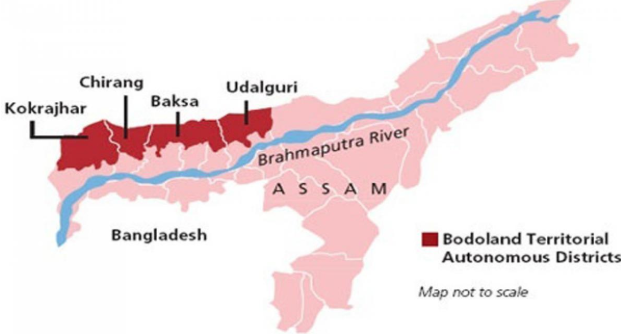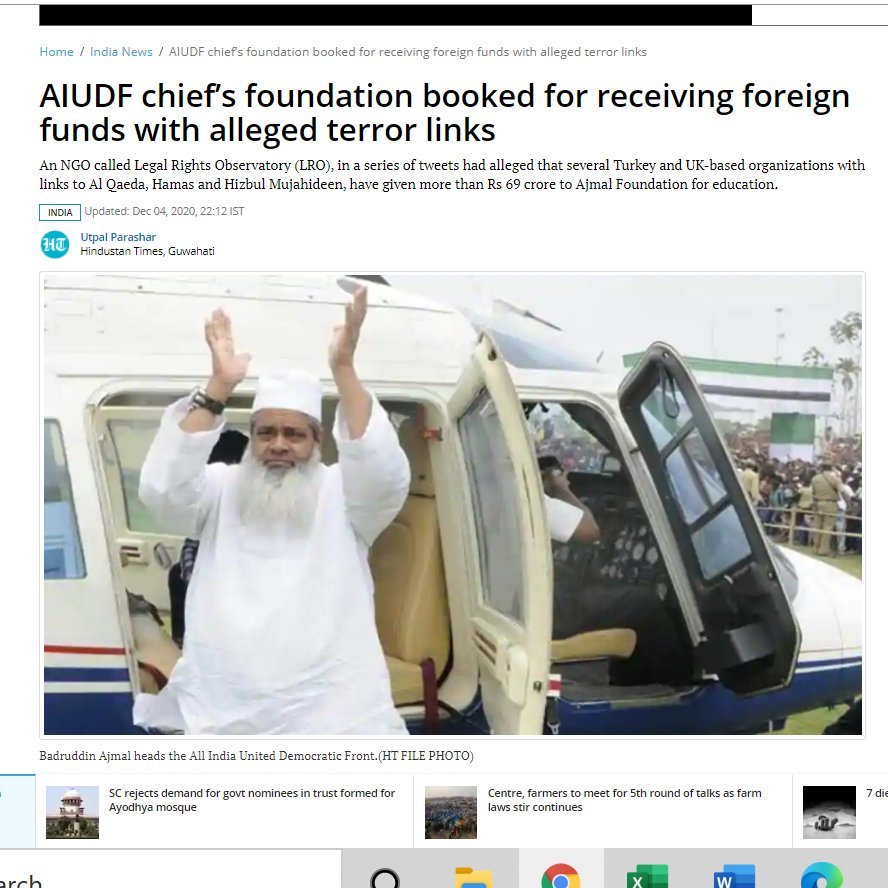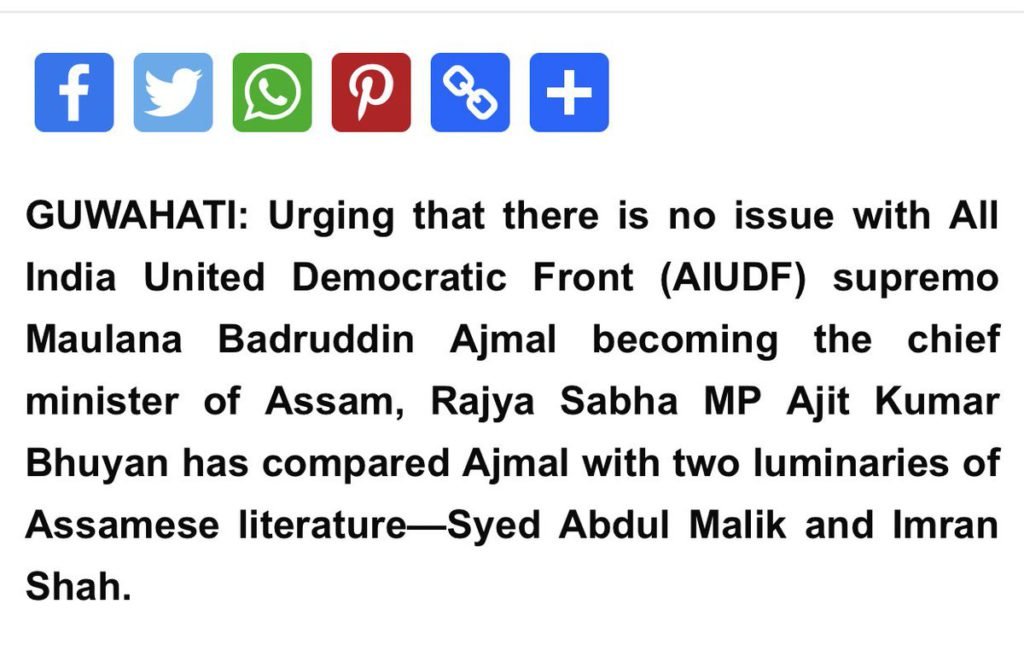BTC Elections in Assam: Amid Reports of Ajmal Foundation’s Terror Links, BJP-UPPL Scripts A Historic Beginning in Bodoland


The results for the elections to the 40-member Bodoland Territorial Council (BTC), which governs the Bodoland Territorial Region (BTR), have significantly marked an end to the three successive regimes by the Hagrama Mohilary-led Bodoland People’s Front (BPF). The UPPL-BJP combine wrested 21 seats in the 40-member BTC elections. In a rather impressive development, the BJP captured 9 seats, whereby it extended its formal support to the United People’s Party Liberal (UPPL) so as to form the council government to be headed by UPPL chief Pramod Boro.
The election results are historic in the sense that the BTC will not only be governed by a party other than the BPF since the formation of the BTC in the year 2003, but also that it will be governed by a coalition for the first time ever. The Congress Party which had formed a pre-poll alliance with the AIUDF, managed to win just one seat at Srirampur (non-ST) while its partner drew a blank. The election results have come as a dire rejection of the Congress-AIUDF combine, signalling at interesting political developments that are about to unfold in the already volatile political scenario of the state of Assam before it goes to the polls in 2021.
It needs to be recalled here that the BPF had been in power in the BTC ever since the year 2005, after the autonomous body was constituted in 2003 under the Sixth Schedule of the Constitution of India, as a political solution to the Bodo agitation for a separate state. It had struck a deal with the ruling BJP after the last Assembly elections, becoming a partner in the state government. But, the relationship between the two had soured when the BTC elections, initially scheduled on April 4, 2020 were postponed due to the COVID-19 pandemic. The Centre had immediately announced President’s Rule in the BTC, which infuriated the chief executive of the Council and BPF chief Hagrama Mohilary. This subsequently brought about a split in the alliance, although the BPF ministers continued to be a part of the Assam Government.
In the high-octane electoral campaigning that took place days ahead of the BTC elections, the ruling BJP had primarily focussed on bringing out issues of corruption and inefficiency against the BPF in an attempt to dislodge it, while at the same time endeavouring to promote the UPPL headed by Promod Boro. In the final tally, the BPF won 17 seats emerging as the single largest party, UPPL 12, while the BJP won 9 seats and the AIUDF-supported Congress Party only one. The BJP, which had won just one seat in the last BTC elections, has dramatically increased its tally this time, even though it would still continue to play the second fiddle in the new dispensation. One of the main reasons for the BPF being able to emerge as the single largest party has been that a majority of the Muslim votes have drifted towards the BPF.
In fact, the hopeless performance of the Congress Party can be gauged from the fact that the Muslims residing in the BTC had perhaps decided after the Friday prayers in the week prior to the first phase of the BTC elections on December 7, to vote en-masse for the BPF rather than the Congress-AIUDF combine. This was mainly done in order to check the march of the BJP in the BTC. The voting pattern of the Muslim community is an important and quite decisive factor in the politics of Assam. During the 2016 state legislative assembly elections too, there were sporadic reports that some of the AIUDF voters in Lower Assam were going back to the Congress (Sethi & Shubhrastha, 2017). What worries the Muslims here in particular is the fact that perfume-baron Badruddin Ajmal might never want to provoke the BJP-led central government in Delhi, for that might imply a threat to his massive business interests both within and outside of the state and in the Gulf too. Hence, the Congress as a national party seemed more feasible to them at that moment to counter the BJP’s chances of forming the government in Dispur.
Moreover, allegations of terror funding levelled by the Legal Rights Observatory (LRO) against Badruddin Ajmal’s AIUDF became a cause of much concern right on the eve of the elections. The LRO made sensational charges with respect to the AIUDF receiving funds from several foreign NGOs having links with terror groups, and also that it had received Rs. 69.55 crore, out of which only Rs. 2.5 crore was spent on education. The LRO has further claimed that one of Ajmal Foundation’s donors – the Al Imdaad Foundation of the UK – is directly linked with the Palestinian radical group Hamas, while another UK-based donor called the Ummah Welfare Trust, is accused of money laundering and terror financing. It has also levelled another allegation that the Ajmal Foundation has links with Turkey-based Insani Yardim Vakfi and UK-based Muslim Aid, which are closely associated with various Islamic terrorist organisations.

Quite expectedly, AIUDF supremo Maulana Badruddin Ajmal termed these charges as ‘baseless and without facts’. He also categorically denied committing any violation of the Foreign Contribution Regulation Act (FCRA) rules or receiving funds from overseas NGOs having links with terror groups. These are serious charges levelled against a primarily Muslim NGO, especially taking into account the current political scenario of Assam and the fast-changing demography of the state. Several BJP functionaries have already lodged an FIR with the police against the Ajmal Foundation, with Assam Finance Minister Himanta Biswa Sarma asserting that the Union Government is likely to soon conduct a probe into the allegations. At a time when a section of the so-called “Assamese intellectuals” seem to be harping on an alliance with the AIUDF to counter the ruling BJP in the forthcoming state assembly elections, the LRO’s revelations have raised several startling questions in the mind of the common middle-class Assamese voter.

Well, coming to the BTC poll results, the dramatic change in the political equations in Bodoland following the signing of the recent Bodo Peace Accord with four factions of the National Democratic Front of Bodoland (NDFB) and the All Bodo Students’ Union (ABSU), was reflected in the mood of the electorate. The BJP’s severing its ties with the BPF which has been the dominant power in the BTC for three successive terms added a fresh flavour into the local political developments of the region. The ruling BPF found it quite a tough task, with new equations threatening to cause an erosion of its share of both Bodo and non-Bodo votes. It needs to be mentioned here that Bodos constitute less than one-third of the total populace in the BTR, and the pre-poll understanding between the BJP and the newly-floated but influential UPPL severely impacted the BPF’s electoral fortunes this time.
The Hagrama Mohilary-led BPF was also, to a large extent, susceptible to the anti-incumbency heat after having enjoyed access to the corridors of power for a long time. It was indeed an intense poll battle never witnessed in Bodoland earlier. The shrill campaign of the BJP led by bigwig Himanta da (as Himanta Biswa Sarma is being popularly referred to) and its retaliation by the BPF supremo Hagrama Mohilary added a lot of spice to the highly-pitched electoral battle. The keen interest and enthusiasm showed by the BJP in the BTC elections also shows that the party, which was almost non-existent in the political space of a state like Assam till a few years back, is now really serious about further expanding its footprint in the Northeast.
While the ruling BPF continued to rely heavily on its development poll plank, an aggressive BJP and its coming together with the UPPL toppled the ruling party’s apple cart eventually. The BPF has never really been able to improve the law and order situation in the region, which actually well emerged as its Achilles heel, especially keeping in mind the new equations of power that came up this time. The biggest drawback and failure of the BPF has been its inability to crack down hard on the thriving racket of illegal firearms in the BTR area. The shadow of the gun has always loomed large over the electoral process in the region and the BTR administration, which assumes a monstrous character as the election season approaches every time. In fact, just a couple of days ahead of the BTC polls this year, a huge cache of sophisticated arms, ammunition and explosives were recovered in Kokrajhar.
Much to the dissatisfaction of Hagrama, it seems that the BJP-UPPL’s political gamble played out quite well!
References:
DISCLAIMER: The author is solely responsible for the views expressed in this article. The author carries the responsibility for citing and/or licensing of images utilized within the text.
